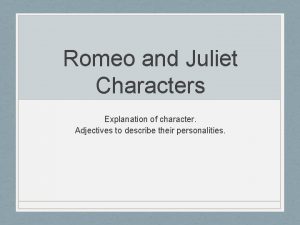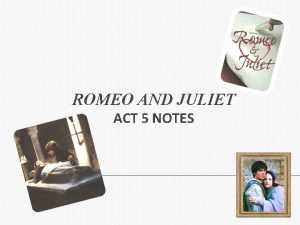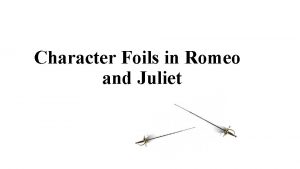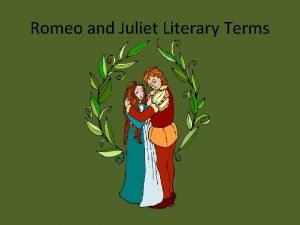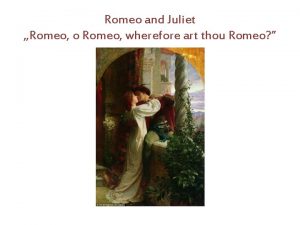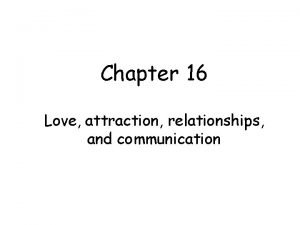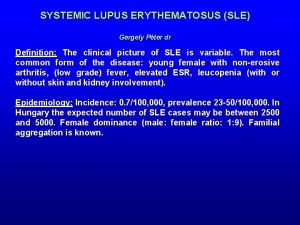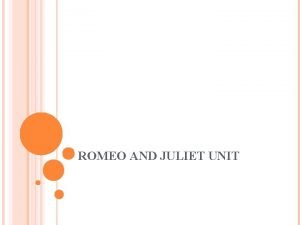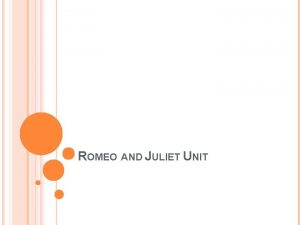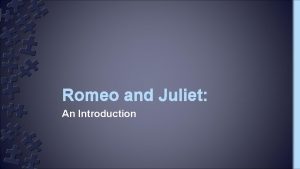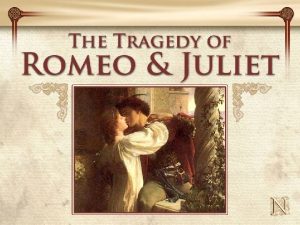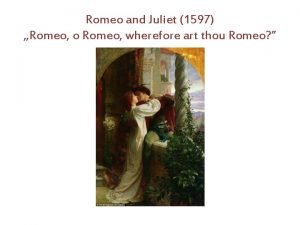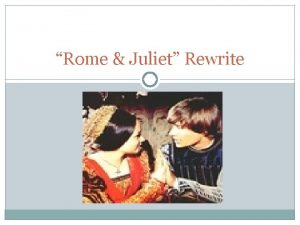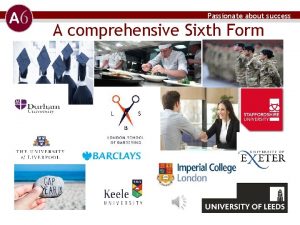Romeo and Juliet Characters Romeo Rash and Passionate




























- Slides: 28

Romeo and Juliet Characters

Romeo: Rash and Passionate • Moody Romeo is desperate because he has a crush on Rosaline but she is not interested: ‘out of her favour where I am in love’. Romeo has no interest in the recent street brawls. He’s been missing from his room at night and wandering around woods in a love-sick manner. According to Mercutio they’ve lost their friend because he’s ‘stabbed with a white wench’s black eye; shot through the ear with a love-song; the very pin of his heart cleft with the blind bow-boy’s butt-shaft’. This is a rather comical image of Romeo’s heart split by Cupid’s love arrow. It portrays him as a sort of Valentine. Mercutio’s alliteration makes fun of Romeo and it’s obvious that his friends think he’s lost the plot over Rosaline.

• Romeo’s feelings for Rosaline do not run very deep. He quickly switches attention to Juliet. Later, Friar Laurence accuses Romeo of loving external beauty rather than the inner person: ‘Holy Saint Francis, what a change is here! …. . Young men’s love then lies not truly in their hearts, but in their eyes’.

• Romeo lapses easily into despair. It seems he has a sixth sense about the future. He reveals his fear about an ‘untimely death’ before entering the Capulet feast.

• Romeo is superstitious from time to time. He fear that ‘some consequence yet hanging in the stars’ will haunt him in the future because he gate-crashed the Capulet party. Romeo often foresees disaster and death throughout the play. He calls himself ‘fortunes fool’ when he’s killed Tybalt.

• When Romeo meets Juliet, he falls deeply in love with her, and he expresses himself like a poet: ‘Oh! She doth teach the torches to burn bright! It seems she hangs upon the cheek of night as a rich jewel in an Ethiop’s ear. Beauty too rich for use, for earth too dear!’ The imagery of other civilizations suggests Romeo is educated and very refined compared to his brawling family.

• Capulet, his family’s enemy, praises Romeo’s civilized nature by calling him a ‘well-governed youth’.

• Romeo’s love for Juliet is so hot he’d reject his own family name: ‘My name dear saint is hateful to myself because it is an enemy to thee’. That is a bit extreme but shows that he was not a typical rich young man.

• Romeo shows good self-control (‘well-governed’)when he refuses to fight Tybalt after his secret wedding, despite being publically insulted as a ‘villain’: ‘I do protest, I never injured thee, but love thee better than thou canst devise’.

• But he shows his rash side when he fights and kills Tybalt in revenge for killing Mercutio whose dying words haunt Romeo: ‘A plague o’ both your houses!’

• His slaying of Tybalt does show loyalty to his Mercutio. We admire this trait, though he never thought of the consequences for Juliet and their marriage.

• Romeo grows insecure at times. He is afraid that Juliet will no longer love him because he has killed Tybalt. Thus he forgot about her speech where she said she’d give up her family name to be with him: ‘Doth she not think me an old murderer. ’

• Friar Laurence gives out to him for being emotionally over the top. Romeo is a bit melodramatic. The Friar argue that brief banishment is better than permanent death. The Friar has to curb Romeo’s impulsive nature: ‘Hold thy desperate hand… thy wild acts denote the unreasonable fury of a beast… Will thou slay thyself? ’ He compares Romeo to a wild animal.

• Romeo admits he can’t endure emotional pain. He can’t bear separation from Juliet: ‘Heaven is here where Juliet lives’. Rather, he cries, ‘exile is death’ when he hears that he has been banished.

• Romeo calms down, accepts the friar’s guidance and trusts in his plans, he regains his self-control and goes into exile after his wedding night, to await a time when he can be with Juliet without danger: ‘and all these woes shall serve for sweet discourses in times to come’. He gains a sense of hope from the friar and from his renewed confidence that Juliet loves him.

• Foolishly, Romeo never returned to the Friar for advice when he sneaks back to Verona upon news of Juliet’s ‘death’. He rashly buys poison from an apothecary. His rashness is further seen when he never question why Juliet’s face is still crimson in the tomb. • He acts on raw emotion by hurrying to Juliet’s side to kill himself: ‘Well Juliet I will lie with thee tonight…… thus with a kiss I die’.

• To sum up: Romeo was acting to his passions throughout the play especially in the case of his killings: Tybalt, Paris and himself. A little thought would have averted tragedy in all cases.

Homework Question: • Identify an important character from a play you have studied and outline some of the obstacles or challenges faced by him or her in the course of the play. How does the character deal with these challenges. Explain. (Don’t forget to state the title and playwright of the play and set the scene)

Juliet character development • Innocent: Old Capulet says that she is not yet mature enough for marriage, even though the friar agrees to marry her to Romeo the very next day: ‘My child is yet a stranger in the world’ She tells her mother marriage is ‘an honour I dream not of’.

• Beautiful: When Romeo first speaks to her he is fascinated by her white skin and exceptional beauty. She is better than all the other posh girls at the feast: ‘Beauty too rich for use, for earth too dear! So shows a snowy dove trooping with crows’.

• Forward: Juliet is forward and far from shy in her responses to Romeo. She tells him that his approach to her is ‘mannerly devotion’ and uses the kiss word first as a hint to him. Later it is Juliet who puts the idea of marriage in Romeo’s head in the balcony scene: ‘send me word tomorrow’.

• Witty: Juliet proves to be witty too when she accuses Romeo of kissing by the book.

• Pained by loyalty clash: Like Romeo she feels emotional pain at the clash between love and family. ‘ My only love sprung from my only hate’

• Brave: Juliet is prepared to go to extreme measures when Romeo is banished. The friar has to persuade her against suicide when she is ordered to marry Paris after the banishment of Romeo. Juliet claims she’d endure serpents and bears rather than accept a second marriage. She tells the friar he can cover her with ‘dead mens’ rattling bones’ if it will save her from marriage to Paris. He turns her will power, ‘strength of will’ to good effect by asking her to fake death to hide out as a corpse in her family tomb. Juliet’s response shows courage.

• Loves intensely: She is so in love that she speaks some of the most poetic lines in the play: ‘Parting is such sweet sorrow’ ‘Take him and cut him out in little stars And he will make the face of heaven so fine That all the world will be in love with night. ’

• Foresees future: Juliet shows an ability to predict the future: ‘Methinks I see thee, as one dead in the bottom of a tomb’.

• Defiant: Juliet has the strength of character to defy her parents in relation to Paris. She says she will not accept a match from her father, but a husband that ‘comes to woo’ or win her by his personality.

• Faithful: Juliet is faithful to Romeo as she dies by her own hand as he did. Juliet wants a ‘timeless end’, one that is motivated by pure love. She refuses the friar’s offer of a life in a convent and his idea that she should ‘bear this work of heaven with patience’. Juliet did not want to live a meaningless life after Romeo. In the friar’s words she died a ‘faithful wife’. Passion killed her.
 Le
Le Romeo romeo where art thou romeo
Romeo romeo where art thou romeo Character traits for romeo
Character traits for romeo Adjectives to describe romeo and juliet characters
Adjectives to describe romeo and juliet characters Balthasar romeo and juliet
Balthasar romeo and juliet Romeo and juliet plot structure
Romeo and juliet plot structure Foil characters in romeo and juliet
Foil characters in romeo and juliet William shakespeares romeo and juliet
William shakespeares romeo and juliet Antagonist in romeo and juliet
Antagonist in romeo and juliet Dramatis personae romeo and juliet
Dramatis personae romeo and juliet Juliet oh juliet where art thou
Juliet oh juliet where art thou Who says let two more summers wither in their pride
Who says let two more summers wither in their pride Rash on upper chest and back
Rash on upper chest and back Sternbergs theory of love
Sternbergs theory of love Latex allergy
Latex allergy Stages of diaper rash
Stages of diaper rash Cifra de fluxo
Cifra de fluxo Chicken pix los pinos menu
Chicken pix los pinos menu Fifths disease rash stages
Fifths disease rash stages George rash west point
George rash west point Esharik
Esharik Rash
Rash Rash exantematoso
Rash exantematoso Huffers rash
Huffers rash Rash-freudian-latex
Rash-freudian-latex Erlotinib rash
Erlotinib rash Pushpa raj sharma
Pushpa raj sharma Hand rash
Hand rash Parvovirus
Parvovirus



